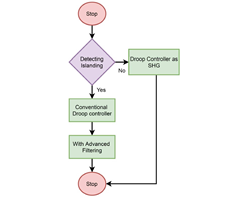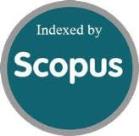Power Sharing and Control by Droop Controller with Advanced Filter Design: A Case Study in Lock-down Periods
DOI:
https://doi.org/10.46604/peti.2021.6106Keywords:
islanding, droop controller, active harmonic filter (AHF), selective harmonic generation (SHG)Abstract
In the lock-down period, the islanding mode of operation with droop controllers has several advantages in the alternating current grid. This study focuses on an improvised droop controller. It consists of an advanced filtering segment embedded with a conventional droop controller, which overcomes the drawback of droop controllers of the non-handling of non-linear loads in an ordinary situation. A selective harmonic elimination technique in grid-connected mode and lock-down mode and an advanced filter embedded with droop control are used so that the proposed controller can also work as an Active Harmonic Filter (AHF). The simulation results in different cases show that the proposed controller can control the active and reactive power in the lock-down period as well as the harmonics in the normal period up to an extent.
References
D. Carmon, A. Navon, R. Machlev, J. Belikov, and Y. Levron, “Readiness of Small Energy Markets and Electric Power Grids to Global Health Crises: Lessons From the COVID-19 Pandemic,” IEEE Access, vol. 8, pp. 127234-127243, 2020.
A. A. Alkahtani, S. T. Alfalahi, A. A. Athamneh, A. Q. Al-Shetwi, M. B. Mansor, M. A. Hannan, et al., “Power Quality in Microgrids Including Supraharmonics: Issues, Standards, and Mitigations,” IEEE Access, vol. 8, pp. 127104-127122, 2020.
A. Molderink, V. Bakker, M. G. Bosman, J. L. Hurink, and G. J. Smit, “Management and Control of Domestic Smart Grid Technology,” IEEE Transactions on Smart Grid, vol. 1, no. 2, pp. 109-119, September 2010.
A. E. M. Bouzid, P. Sicard, H. Chaoui, A. Cheriti, M. Sechilariu, and J. M. Guerrero, “A Novel Decoupled Trigonometric Saturated Droop Controller for Power Sharing in Islanded Low-Voltage Microgrids,” Electric Power Systems Research, vol. 168, pp. 146-161, March 2019.
Y. Zhang, N. Gatsis, and G. B. Giannakis, “Robust Energy Management for Microgrids with High-Penetration Renewables,” IEEE Transactions on Sustainable Energy, vol. 4, no. 4, pp. 944-953, October 2013.
Y. Han, X. Ning, P. Yang, and L. Xu, “Review of Power Sharing, Voltage Restoration and Stabilization Techniques in Hierarchical Controlled DC Microgrids,” IEEE Access, vol. 7, pp. 149202-149223, 2019.
R. Haider, C. H. Kim, T. Ghanbari, S. B. A. Bukhari, M. S. uz Zaman, S. Baloch, et al., “Passive Islanding Detection Scheme Based on Autocorrelation Function of Modal Current Envelope for Photovoltaic Units,” IET Generation, Transmission & Distribution, vol. 12, no. 3, pp. 726-736, February 2018.
A. Rostami, M. Bagheri, S. B. Naderi, M. Negnevitsky, A. Jalilian, and F. Blaabjerg, “A Novel Islanding Detection Scheme for Synchronous Distributed Generation Using Rate of Change of Exciter Voltage Over Reactive Power at DG-Side,” Australasian Universities Power Engineering Conference, November 2017, pp. 1-5.
A. Llaria, O. Curea, J. Jimenez, and H. Camblong, “Survey on Microgrids: Analysis of Technical Limitations to Carry Out New Solutions,” 13th European Conference on Power Electronics and Applications, September 2009, pp. 1-8.
H. Han, X. Hou, J. Yang, J. Wu, M. Su, and J. M. Guerrero, “Review of Power Sharing Control Strategies for Islanding Operation of AC Microgrids,” IEEE Transactions on Smart Grid, vol. 7, no. 1, pp. 200-215, January 2016.
A. M. Bouzid, M. A. Hamida, M. R. Kafi, and H. Chaoui, “Robust Angle Droop Controller Based on Pilot Point Voltage Measurement in Low-Voltage Microgrid,” 1st International Conference on Sustainable Renewable Energy Systems and Applications, IEEE Press, December 2019, pp. 1-6.
Y. Wang, H. Jiang, L. Zhou, and P. Xing, “An Improved Adaptive Droop Control Strategy for Power Sharing in Micro-Grid,” 8th International Conference on Intelligent Human-Machine Systems and Cybernetics, August 2016, pp. 50-53.
H. Bierk, A. Albakkar, and E. Nowicki, “Harmonic Reduction in the Parallel Arrangements of Grid-Connected Voltage Source Inverters,” 2nd International Conference on Electric Power and Energy Conversion Systems, IEEE Press, November 2011, pp. 1-6.
A. Reznik, M. G. Simões, A. Al-Durra, and S. M. Muyeen, “LCL Filter Design and Performance Analysis for Grid-Interconnected Systems,” IEEE Transactions on Industry Applications, vol. 50, no. 2, pp. 1225-1232, March-April 2014.
A. M. Bouzid, P. Sicard, J. Paquin, and A. Yamane, “A Robust Control Strategy for Parallel-Connected Distributed Generation Using Real-Ttime Simulation,” IEEE 7th International Symposium on Power Electronics for Distributed Generation Systems (PEDG), IEEE Press, June 2016, pp. 1-8.
S. Jayalath and M. Hanif, “Generalized LCL-Filter Design Algorithm for Grid-Connected Voltage-Source Inverter,” IEEE Transactions on Industrial Electronics, vol. 64, no. 3, pp. 1905-1915, March 2017.
S. Behera, S. K. Behera, and B. B. Pati, “Impact of DFIG in Wind Energy Conversion System for Grid Disturbances,” Proceedings of Engineering and Technology Innovation, vol. 13, pp. 10-19, July 2019.
R. D. Patidar and S. P. Singh, “Harmonics Estimation and Modeling of Residential and Commercial Loads,” International Conference on Power Systems, IEEE Press, December 2009, pp. 1-6.
R. Majumder, A. Ghosh, G. Ledwich, and F. Zare, “Angle Droop Versus Frequency Droop in a Voltage Source Converter Based Autonomous Microgrid,” IEEE Power & Energy Society General Meeting, July 2009, pp. 1-8.

Published
How to Cite
Issue
Section
License
Submission of a manuscript implies: that the work described has not been published before that it is not under consideration for publication elsewhere; that if and when the manuscript is accepted for publication. Authors can retain copyright of their article with no restrictions. Also, author can post the final, peer-reviewed manuscript version (postprint) to any repository or website.

Since Oct. 01, 2015, PETI will publish new articles with Creative Commons Attribution Non-Commercial License, under The Creative Commons Attribution Non-Commercial 4.0 International (CC BY-NC 4.0) License.
The Creative Commons Attribution Non-Commercial (CC-BY-NC) License permits use, distribution and reproduction in any medium, provided the original work is properly cited and is not used for commercial purposes







